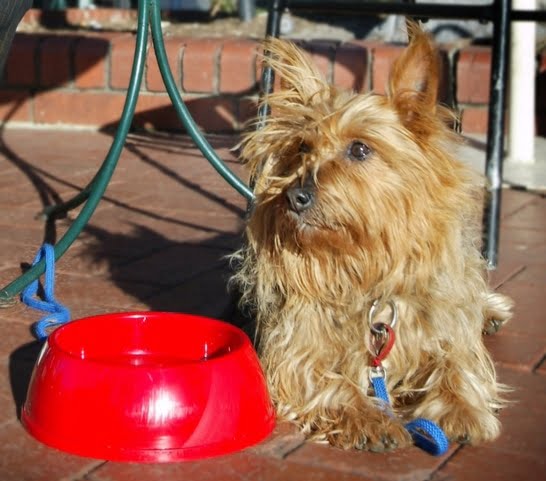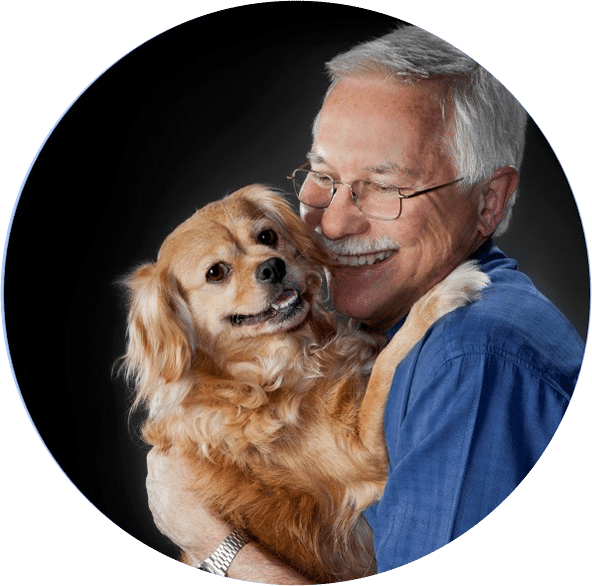Making a Meal of It
“Oh – he’s my child, Doctor Day! Nothing but the best for Micky. Wouldn’t think of feeding him anything less than the food I feed myself.”
Micky McGory was a much loved Fox Terrier. He was the apple of his mother’s eye and he knew it. Nevertheless, Micky was obese, had a poor hair coat and decaying teeth. Mrs McGory would have done a lot better by feeding Micky as if he were a dog and not as if he were a human being!
Feeding pets is a big responsibility. They have no choice but to eat that which is put in front of them. If you get it wrong, the effects can be devastating and long lasting.
The basic notion is simple. A pet needs a balanced diet. However, what may be a balanced diet for a bouncy Australian Cattle dog may be just the wrong thing for a sedate and tubby Labrador. What about a young puppy or kitten? Should you feed them the same as an adult animal? As for aged dogs, they don’t need special consideration – do they?
To feed your dog or cat correctly you need to provide a different diet for each stage of your pet’s life. You also need to vary your pet’s diet depending on how active it is. For puppies, you should provide a different diet for the large, fast growing breeds than you would give for a smaller breed.
Puppy and Kitten Feeding
If you have a pup or kitten, it will be growing rapidly, building muscles and bones and spending a vast amount of energy with its ‘exuberance of youth’.
Your young pet needs more protein for its muscles, more minerals and vitamins for its bones and active metabolism and more calories due to its exuberant activity and rapid growth than an adult dog or cat.
However, it is important, especially for large breeds of dogs, that they are not over-fed. Your fat roly-poly puppy may look cute and teddy-bear like, but it is likely to have problems with obesity and skeletal problems when it matures. This is because excess food increases the number and size of fat cells that your pet’s body manufactures as it grows. Once your pet has made the excess number of fat cells, the cells won’t go away. They are there waiting to sponge up any excess fat in your pet’s diet.
So, rather than overfeeding pups and kittens, feeding them slightly less than they need is better. You also need to feed them a balanced diet, and if you do, supplementation with calcium or other vitamins is not necessary and could even be harmful. Large breeds need a food lower in calories and minerals to prevent over-consumption of nutrients and, thereby, to prevent bone problems such as Hip Dysplasia.
My Dog is Fat – What should I do?
Obesity is the commonest nutritional disease in pets. In societies like ours, 25% of humans and from 24% to 44% of dogs are obese. It is interesting that obese people are more likely to have obese pets. Labradors, Cairn Terriers, Cocker Spaniels and Daschunds are the breeds that top the ‘tubby’ list in dogs.
Dogs cannot get fat on thin air. To restore normal weight, decrease the number of calories that your dog is eating and increase the number of calories that your dog is using. The formula is simple – reduce the amount of food or at least the number of calories in the food and increase your dog’s exercise.
Low calorie ‘super-premium’ diets, such are available from your veterinarian or pet shop. Be sure to weigh your dog before starting the diet and then weekly. Set a target weight and work towards achieving that weight in two months. If your pet’s weight has not reduced by the time you weigh it each week, then sack yourself as a pet owner!
My Pet is a Finicky Eater – What Should I do?
Many dogs are fussy eaters and some are so fussy that they do not maintain a correct weight. A very tasty diet that is high in calories will solve the problem. You should feed your dog an increased amount of fat, protein and energy to achieve this.
Active dogs require the same type of diet as this too. This includes working dogs, racing dogs, show dogs or any pet that is ‘on the go’ all day long.
The easiest way to feed the right diet for these types of pets is, again, to visit your veterinarian and ask for an Active Formula dog food.
Are Super Market Brands Suitable?
With pet foods, you get what you pay for. The cheaper brands generally have lower quality ingredients with very low digestibility. This means that your dog or cat is unlikely to be able to extract the nutrients from the food. Low price foods are not economical as you have to feed more of them for your pet to get sufficient nutrients. If you feed a cheap brand, the food you put into your pet’s mouth will go through its body undigested. Your dog will then unceremoniously dump the food onto the lawn when it goes to the toilet.
The value of super-premium foods is that they are extremely digestible. This means that you will feed less compared with the supermarket brands, that your pet can extract all the nutrients that are in the food, and that the faeces produced will be smaller, more solid and easier to clean up.

